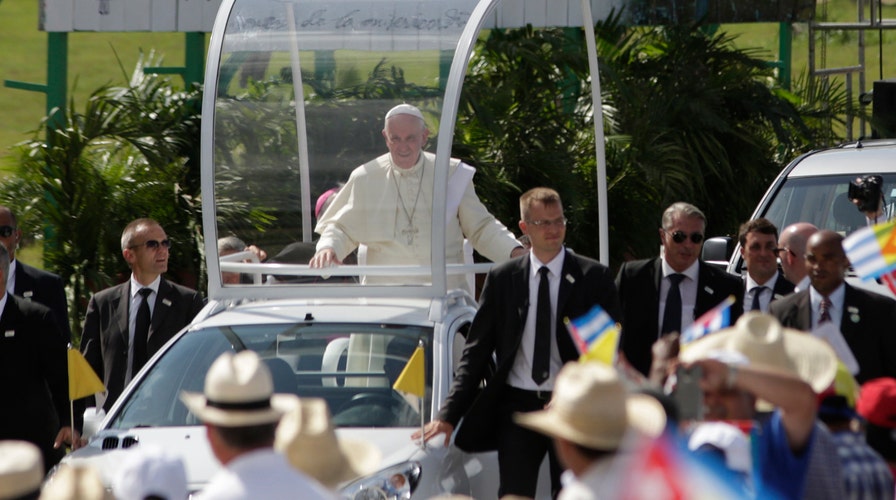Pope Francis asked Cubans to try to overcome ideological preconceptions and be open to change, as he celebrated morning Mass in the city of Holguin Monday.
Holguin's Plaza of the Revolution was packed with an estimated 150,000 people for the Mass,and singing children and a small crowd waving Cuban and Vatican flags greeted Francis on his arrival, some crying out, "Francis! Holguin is with you!"
In his homily, Francis told the crowd of how Jesus picked a lowly and despised tax collector, Matthew, and instructed him without casting judgment to follow him. That experience of mercy changed Matthew forever.
Francis told the Cubans that they, too, should allow themselves "to slowly overcome our preconceptions and our reluctance to think that others, much less ourselves, can change."
"Whoever wishes to be great must serve others, not be served by others," he said. "Service is never ideological, for we do not serve ideas, we serve people."
It was a subtle jab at the communist system, which the Vatican spokesman, the Rev. Federico Lombardi didn't deny. "The pope doesn't tend to make explicitly political speeches, but he has some general principles and everyone is free to apply their different experiences of life on them," he said.
Francis offered similar advice Sunday night in a casual encounter with young people. He encouraged them to dream big about what their life could be like, and not be "boxed in" by ideologies or preconceptions about others.
"If you are different than me, why don't we talk?" Francis asked the crowd. "Why do we always throw rocks at that which separates us?"
Security agents didn't appear to be letting members of the crowd get close to the pontiff Monday. An apparent dissident hung on to the pope mobile in Havana and seemed to be appealing to the pontiff before he was dragged away Sunday.
The head of the opposition group Ladies in White said 22 of 24 members who wanted to attend Francis' Mass on Sunday were prevented from going by Cuban security agents. And two well-known Cuban dissidents said agents detained them after the Vatican invited them to the pope's vespers service at Havana's cathedral.
Lombardi, confirmed that some dissidents were invited to events to receive a greeting from the pope, but he said he didn't know why it didn't come to pass.
Asked if the Holy See would lodge an official protest, Lombardi demurred. He stressed that what was planned was just a "passing greeting," not an official meeting, and that it was set up at the last minute out of a "desire to show an attention for everyone, including dissidents."
As part of his Cuban tour, the pope spent the weekend in Havana, where he said Mass and met with Fidel and Raul Castro. The informal conversation included an exchange of books and discussion about big issues facing humanity, including Francis' recent letter to bishops on the environment and the global economic system.
The pope’s message comes at a delicate time of change in Cuba as the communist country negotiates normalization of ties with its longtime foe, the United States, and undertakes modest free-market reforms that have opened some sectors of the economy to private enterprise while keeping large-scale enterprise in state hands.
"In his message he called on young people to not be afraid to dream," Yordani Monteagudo, a 24-year-old government worker said. "This makes you want to live, and build up this country."
Cuba has long defined itself by its rejection of the competition and self-interest that many see as central to life in the U.S. and other developed countries.
Many Cubans complain about the rigidity of the Cuban system in which nearly every aspect of life is controlled by the government, from cultural institutions to block-level neighborhood watch committees. Cubans also are increasingly concerned about growing inequality, in which those with access to foreign capital live in luxury while others can barely feed themselves, generating jealousy and division.
Francis' Monday homily also reflected a very personal story of his own faith and willingness to embrace change.
On Sept. 21, 1953 -- 62 years ago Monday -- a 17-year-old Jorge Mario Bergoglio went to confession at his parish church in Buenos Aires. During the confession, he later wrote, he "realized God was waiting for me," and knew he was going to become a priest. Bergoglio wouldn't enter the seminary for several more years, but Sept. 21 -- the feast of St. Matthew -- has remained a crucial reference point for the pope.
The pope is expected to head to Santiago on Cuba's eastern end before flying Tuesday to Washington for the U.S. leg of his visit. He will also make stops in New York and Philadelphia.
The Associated Press contributed to this report.

